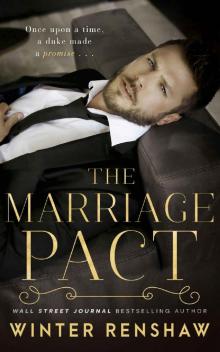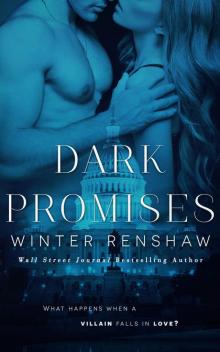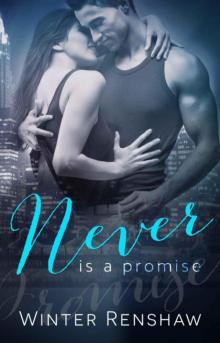- Home
- Winter Renshaw
The Cruelest Stranger Page 2
The Cruelest Stranger Read online
Page 2
Like a child.
Facing ahead, I take another drink, the glass trembling in my hand as a cocktail of thoughts swarm my head. The mirror behind the bar catches my reflection, and it isn’t pretty, but this time it has nothing to do with the damp, wiry, dishwater-blonde bun or the bar bathroom makeover.
Basic human decency is the one thing I value most in this world, and this man has none of it.
The full weight of his piercing stare anchors me to my seat, and every atom in my body is shouting for me to stay, to not march ten feet down the bar to give him a piece of my mind.
But today marks the anniversary of one of the worst days of my life, I was caught in a rainstorm and stood up, and I’m about two cocktails deep.
My self-control is non-existent.
Drink in hand, I slide off my seat and saunter toward the infuriatingly handsome asshole in the five-hundred-dollar sweater, but before I have a chance to utter a single word, he speaks first, “You seem incredibly insecure about something. Are you okay?”
“Excuse me?” I’m glaring, and I never glare. This isn’t good. This man’s about to bring out a side of me I never knew existed. And what the hell is he talking about? Insecure? “What kind of—”
“—what kind of asshole bothers a stranger for no reason?” he commandeers my question like he owns it. “Let me ask you this, when you saw me come in, saw me take a seat at the end of the bar away from everyone, what part of that gave you the impression that I wanted to be bothered?”
The man has a point—especially if he isn’t Garrett.
But it still doesn’t make him any less of a prick.
“I wasn’t trying to bother you, I was—”
“Really?” His full lips tug into a taut smirk, his tone as sharp as it is incredulous. “Because I’m pretty sure when you were waving at me and smiling and saying ‘Hi, excuse me’ in that cutesy little voice fifty thousand times … you were trying to bother me.”
“Are you always this cruel?”
“Are you always this desperate?” He doesn’t miss a beat.
My grip tightens on my glass. I’d love nothing more than to dump the remainder of this drink down his pretentious designer sweater.
Lucky for him that isn’t my style.
Besides, it’d be a shame to waste all that top-shelf liquor on a bottom-shelf bastard.
“For your information, I was supposed to meet someone here tonight. Someone fitting your description,” I say.
His jaw sets.
He takes a sip of his drink staring ahead, flashing a smirk that advertises a perfect dimple in the middle of his cheek. “Sure you were.”
“What, you think this is something I do to meet men?” My voice is pitched higher than I intended.
“You said it.” His brows rise as he centers his drink on a coaster.
“Don’t flatter yourself. You’re not my type.”
He sniffs. “I’m everyone’s type.”
I’m … speechless.
Is this jerk for real?!
Not only is this vexatious stranger cruel, heartless, and lacking in basic human decency, he’s also the epitome of arrogant.
“You can leave now.” He waves me off, but I’m stunned into silence as I try to gather my thoughts so I can leave him with one last zinger of a comeback.
“Everything okay over here?” Eduardo is hunched over the other side of the bar, his watchful stare passing between us. I swear he came out of nowhere—that or I was too distracted by this man’s willful audacity to notice him approaching us.
The cocky Adonis shoots me a glance before turning his attention to the bartender.
“We’re good, Eduardo,” he says. “I was just giving our friend here a lesson in etiquette, appropriacy, and basic decorum.”
Once again, I have no words.
Rising from his bar stool, he finishes the remainder of his drink with a smooth swallow before shouldering into his wool trench, heading for the door, and disappearing into the cold, dark evening.
Rain drops pelt the windows, obscuring anything and everything on the other side of the glass.
Peeling my fruitless gaze from that direction, it settles on an umbrella leaning against the wall next to the door.
His umbrella.
The blackest black.
The color of his soul—or the empty space in his chest where his heart should be.
Fitting.
Without giving it another thought, I slap a twenty on the counter and slip into my coat.
A moment later, I’m grabbing the stupid thing and diving out into the rain, praying I catch him in time.
As incensed as I am, as infuriating as he is, sometimes the best thing to do is fight cruelty with kindness. It’s something I learned early on in my life and something I instill in my students from the second they enter my classroom.
I spot him at the end of the block, waiting for the crosswalk to change.
Picking up my pace, I canter over cracked and pitted concrete, squeeze past umbrella-wielding locals—and make it to the end of the street just in time for the light to flick from neon white to warning-sign orange, forcing me to stop.
I wait where I am, my gaze trained on him in case he turns onto a side street.
The traffic signals begin to change, and within seconds, the crosswalk blinks to white.
I sprint across, ignoring the stinging cold rain drops pelting my skin, the frigid air biting through my clothes, and the painful clench in my jaw that keeps my teeth from rattling.
I’m a mere half of a block from him when he turns and disappears inside a local business.
But it isn’t just any business …
… it’s the Paulley-Hallbrook Funeral Home—a place I know well.
A moment later, I’m standing outside the very doors he walked into mere moments ago, frozen in every sense of the word.
The rain slows, gentle.
And then it stops.
Earthy petrichor fills my lungs as I witness the dark-haired, cruel-hearted mystery man as he’s greeted by a lady in a charcoal pant suit.
She places a hand on his shoulder and gives him an apologetic wince before escorting him away.
I wanted to give him the umbrella to teach him a lesson in compassion.
The irony of that isn’t lost on me.
2
Bennett
“Sorry I’m late. Got here as soon as I could,” I lie.
I didn’t rush here.
I took my time.
And I stopped down the street for a drink and to gather my thoughts first—a mistake in hindsight thanks to an audacious woman, but that’s neither here nor there.
“Please, apology not necessary.” The funeral director—a grandmother type who smells like dead flowers and discount perfume and gives too many hugs and arm squeezes—hangs my soaked trench on a wooden coat rack in her office. I left my umbrella at the bar. I won’t be going back for it. “Why don’t you have a seat there and we can get started.”
I check my watch.
Take a seat.
Pray this doesn’t take all night.
The woman, whose name tag reads CLAUDETTE PAULLEY, DIRECTOR, squeezes into her chair on the other side of the desk and retrieves a small booklet from a stack to her left. The cover showcases a glossy white casket surrounded by floral arrangements too perfect to be real.
“When we spoke on the phone earlier,” she says, “you had mentioned cremation. Is that still—”
“—yes.” I don’t have time for her imprudent, time-wasting questions.
Once my mind is made up, there’s never any changing it.
“All right then.” She gives me a soft smile. Her bright pink lipstick bleeds into the lines around her mouth.
“Why don’t we discuss the service.” She glances up at me then down at her wringing hands. I must make her nervous. “And then I can show you some lovely urn options …”
“There won’t be a service.” I shift in this impossibly uncomfortable chair. “And
you can choose the urn. Surprise me.”
Her lip form a wrinkled ‘o’ and she blinks before reanimating. “I see then.”
“Larissa didn’t have a lot of friends.” At least none that I would presently allow within a hundred yards of this place. “And as far as family goes, we’re rather private. A small memorial should suffice. An hour or two this Saturday if you can fit us in.”
Claudette searches my face for what I assume are emotions, but her time would be better spent hammering out the final details of Larissa’s memorial.
Reaching for a black, leather-bound planner, she flips it open to today’s date before licking her index finger and flicking to Saturday.
“We could do ten to noon.” She reaches for a logo-emblazoned pencil in a logo-emblazoned mug full of other logo-emblazoned pencils.
Classy.
“You don’t have anything earlier?”
She squints. “Well, we could certainly move it up. The timing is typically more of a convenience thing. If we hold it too early, it could be difficult for some people to get here, especially if they’re coming from out of town.”
“I can assure you that won’t be an issue.” I check my watch again, not because I have somewhere else to be, but because this woman needs to get on with this shit show already.
She scratches a few words into her planner with messy, shaky handwriting. “Eight to ten it is. Now, as far as the obituary, I have a form you could fill out or I could go over everything with you personally.”
“The form is fine.”
Her yellow-oak chair creaks as she reaches to open a desk drawer, and then she fishes out a chipped plastic clipboard and a piece of paper before handing them over.
This place is all kinds of fancy and formal.
My couture-loving mother certainly spared no expense when she had them ship Larissa’s lifeless corpse here.
The questions are endless and I don’t know the answer to half of them.
The answers to the other half of them are extraneous and unnecessary.
I don’t have time to write a fucking biography.
I scribble her birthdate into the first line—February 22.
They already have her death date.
Everything else is irrelevant.
3
Astaire
“Can I ask you something?” Back at Ophelia’s, I slide my empty water glass toward Eduardo. I’ve been sitting here for over an hour now, waiting to sober up enough to go home. “It’s kind of random …”
That isn’t true.
My question isn’t random at all—I don’t know why I said that.
“Sure.” He shrugs, eyeing a couple as they stumble out the door.
“Who was that guy?” I point to the empty bar stool at the end. “The one in here earlier?”
“The one you chased out of here?” He sniffs. I can’t tell if he’s annoyed, amused, or something else.
“He forgot his umbrella …,” I’m quick to defend my actions, “but yeah. Who was that?”
“Shane Bock.” He wipes a speck of condensation from the bar top with his rag.
“Is he from around here?”
“He is.” Eduardo lifts his hands. “But look, whatever you two had going on earlier, I don’t want any part in that. Looked pretty intense.”
“To say the least.” I shake my head, our conversation still fresh in my spinning head. “I was supposed to meet someone here tonight and I thought that was the guy. Didn’t even get a chance to ask him if he was Garrett before he started accusing me of hitting on him. Who does that?”
“Garrett, you said? Some guy was in here earlier by the name of Garrett. He was looking to meet up with someone, but he didn’t wait that long. Think it was around six-ish? Didn’t stay but ten minutes is all.”
My stomach plunges.
It must have been when I was in the bathroom trying to salvage my date-night look.
“Dark hair? Tall?”
“Something like that,” he confirms.
This day can screw itself. Truly.
I check the time on my phone. I could swear I’ve been here all night, but it’s only been a couple of hours at the most.
To be safe, I decide to drink one more glass of water and wait one more hour—because that’s what decent people do, and I’m a decent person.
I’m also decently curious.
“That Shane guy,” I say to Eduardo when he comes by to check on me a while later.
A melancholic Muse song plays over the speakers, and outside a man lights a cigarette for a woman in a red dress. The place grows emptier by the minute.
“Ah. We back to that?” He rests his fist against the bar, feigning annoyance. Or maybe he truly is annoyed.
At this point, it doesn’t matter.
Curiosity’s steering the ship and there’s no turning back.
“You said he’s from around here?”
“Ever heard of Shane Bock Corporation?”
“Nope.” I rest my elbow on the bar top and my chin on my hand, all ears.
“You’re not from here, are you?”
I sip my water. “Moved here a couple of years ago. Took a job teaching kindergarten at Starwood.”
“Adorable,” he says, though I believe he’s being sarcastic. “Two years here and you’ve never once seen a Shane Bock Bridge? Never driven past the Shane Bock Park? Hiked the Shane Bock trail?”
I rack my brain and can’t think of a single instance when I’ve come across a Shane Bock anything. And what kind of man names all those things after himself? Unless it’s a family name? Maybe his grandfather was a Shane, though I can’t imagine that was a common name seventy-odd years ago.
“His family,” Eduardo continues, “is practically Chicago royalty. You sure you’ve never heard of Shane Bock Corporation?”
I shake my head.
“They own that factory on the west side,” he continues, pointing, “the one that makes plastic products. And they own those furniture stores that are all over the state. A national insurance agency, a major league baseball team …”
I lift a palm. “All right. I get it. He’s loaded and he diversifies. But is he always that … extreme?”
I don’t tell him about the funeral home on purpose—hoping Eduardo knows something and will share it voluntarily. I’ll be damned if I tell him I followed him all the way down to the funeral home on the corner. Crazy is as crazy does, but I’m giving myself a pass for tonight.
Eduardo mulls my question, the corners of his thin mouth curling down as he lifts a single shoulder. “Honestly, he comes in here about once a week, and that’s the most I’ve ever seen him talk to anyone. You should consider yourself lucky.”
I laugh because he has to be joking …
… only I’m met with a somber expression.
I’m seconds from responding when something catches the corner of my eye.
A silver logo.
On the umbrella’s handle.
SCHOENBACH CORPORATION
Schoenbach … Shane Bock.
“Anything else I can get you? Another water?” Eduardo changes the subject, his fingers rapping against the counter’s edge.
Gathering a lungful of faded-perfume-and-whiskey-scented air, I shake my head, and the instant he’s gone, I retrieve my phone from my bag. With electric fingers, I type the name “Schoenbach” into a search engine, combining it with words like “obituary” and “Paulley-Hallbrook Funeral Home” and “Worthington Heights, Illinois.”
But I get nothing.
The man remains a mystery … an infuriating, enigmatic mystery man with a story begging to be unraveled so I can make sense of what happened tonight.
Two hours later, I’m lying in bed, phone in hand, searching in vain for something, a clue, a lead, anything, but all I manage to uncover is that his first name is Bennett and he runs the Schoenbach Corporation.
Everything else is a shrouded.
Even the biography on his company’s website is two
lines long: Bennett Schoenbach is a lifelong resident of Worthington Heights. Succeeding his father and grandfather, Bennett assumed ownership of the Schoenbach Corporation in 2014.
Growing up, I had a foster mom that used to tell me everyone had a story, that I shouldn’t judge anyone without knowing it. As I got older, I learned that it’s human nature to judge. In college, one professor theorized that it goes to our Neanderthal ancestry, when survival depended on sizing up the intentions and capabilities of those around us.
I reach for my remote and pull up the Turner Classic Movies channel, dialing the volume down until I can barely hear the comforting lilt of Rita Hayworth’s voice in the background, lulling me to sleep.
Maybe I’m tired and overthinking, maybe I’m still trying to wrap my head around tonight’s events, but I want to know his story.
I’m going to know his story.
One way or another.
I don’t know how, but I will.
And I’m sure it’ll explain everything.
4
Bennett
“The Alcott expense report.” I startle my assistant, Margaux, Friday morning. She damn near spills her coffee down her eyelet blouse, eyes wide as they lock onto me.
She wasn’t expecting to see me today, which is a shame.
All these years working together and the woman doesn’t know me at all. I’d have fired her early on, but her loyalty to my father during his tenure here has kept me from pulling the trigger.
My grandfather was always huge on loyalty. He believed it should be handsomely rewarded and never taken for granted. Besides, if she can handle him, she can handle me. And that counts for something.
“You said you’d send it last night,” I refresh her memory, my finger rapping on the edge of her unorganized desk.
Last Christmas I gave her an extra week of paid vacation and when she was gone, I brought in a professional organizer to give her area a “makeover,” thinking I was doing her (and the rest of us who have to walk past this hot mess on a daily basis) a service—only the spic-and-span tidiness lasted a mere six weeks before she had completely reverted to her old ways.

 Pricked
Pricked Enemy Dearest
Enemy Dearest The Marriage Pact
The Marriage Pact The Match - A Baby Daddy Donor Romance
The Match - A Baby Daddy Donor Romance Exmas
Exmas For Lila, Forever
For Lila, Forever![[2018] PS I Hate You Read online](http://i1.bookreadfree.com/08/2018_ps_i_hate_you_preview.jpg) [2018] PS I Hate You
[2018] PS I Hate You The Cruelest Stranger
The Cruelest Stranger The Complete Rixton Falls Series
The Complete Rixton Falls Series The Executive
The Executive P.S. I Dare You (PS Series Book 3)
P.S. I Dare You (PS Series Book 3) FILTHY - a Football Romance
FILTHY - a Football Romance War and Love
War and Love ARROGANT BASTARD
ARROGANT BASTARD Country Nights
Country Nights The Rebound
The Rebound Cold Hearted
Cold Hearted Dark Promises
Dark Promises Bitter Rivals: a novella
Bitter Rivals: a novella Vegas Baby
Vegas Baby The Perfect Illusion
The Perfect Illusion P.S. I Hate You
P.S. I Hate You NEVER KISS A STRANGER (A Stepbrother Romance)
NEVER KISS A STRANGER (A Stepbrother Romance) Absinthe
Absinthe Priceless (An Amato Brothers/Rixton Falls crossover)
Priceless (An Amato Brothers/Rixton Falls crossover) Never is a Promise
Never is a Promise Bachelor (Rixton Falls #2)
Bachelor (Rixton Falls #2) ARROGANT MASTER
ARROGANT MASTER